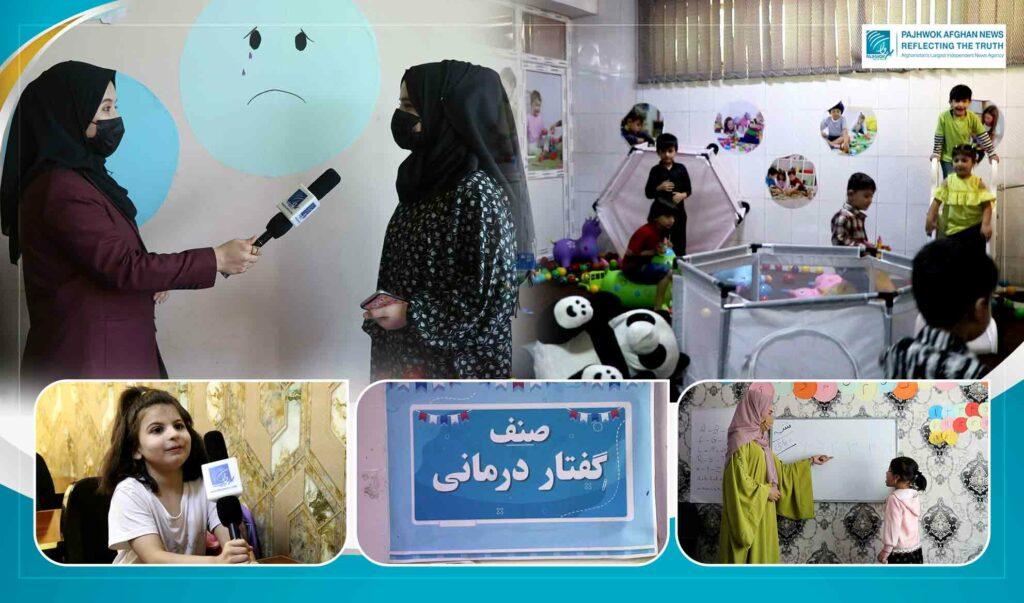KABUL (Pajhwok): The ‘Kabul Speech Therapy and Rehabilitation Center’ is a place where dozens of children with autism, as well as adults experiencing speech problems after a stroke, receive training in cognitive games and speech skills.
According to doctors, autism is a neurodevelopmental disorder that affects how individuals communicate, interact socially, behave, and learn. This disorder usually appears in early childhood (before the age of three) and remains with the individual for life. However, with timely diagnosis and professional intervention, the quality of life for people with autism can be significantly improved.
Such individuals face communication challenges such as the inability to initiate or maintain conversations, difficulty understanding body language or tone of voice, delayed speech development, or limited use of words.
Kabul brain speech therapy, rehabilitation center
This center is a place for children with autism; currently, dozens of children are under care at this center, and the teachers are striving to improve the condition of these children.
Sayed Mohammad Elham Hashimi, the founder, established the Kabul Brain Speech Therapy and Rehabilitation Center five years ago and subsequently entrusted the management and all work affairs to women.
This center for children with autism differs from typical educational institutions. In every classroom, you can hear teachers’ voices as they teach the basics of speech to these children.
Children who cannot speak or hear, and who also have behavioral challenges—both boys and girls—attend separate classes where they listen to their teachers. Sometimes they are attentive, and sometimes they get distracted.
Neelab Mohammadi, one of the psychologists who graduated from the Special Education program at Kabul Education University, told Pajhwok that currently, 120 children with autism are being cared for by 30 female instructors at the center.
She said the center includes departments for speech therapy, cognitive therapy, motor therapy, and auditory training classes.
As the center’s director, she noted that previously, such a facility did not exist in the country, and some families had to take their children abroad for treatment.
Mohammadi explained that treatment varies for each child: some may show improvement within a month, while others may need more time—sometimes even up to a year.
According to her, over the past five years, the center has had six graduating groups, and the children who graduated were introduced to public schools, where they are now studying in second and third grades.
She urged families of children with autism not to neglect treatment, emphasizing that earlier diagnosis meant quicker treatment.
Mohammadi added that the center also treats adults.
She explained: “Our center is not just for children. We also treat adults—those who, after a stroke, can no longer speak well despite having previously been able to speak. We help people who stutter, those who have difficulty pronouncing certain sounds, or those who lack self-confidence.”
A Psychologist: Families should be kind, supportive to such children
Sheila Asghari, a psychologist, says: “Establishing this center is not only beneficial for these children but also creates motivation for the parents. Nowadays, we see in the streets and markets that these children are called bad names. Creating such centers gives parents whose children have these problems the motivation to no longer feel ashamed or embarrassed of their children and not to think that they are a burden on society.”
She added: “Unfortunately, many parents initially do not accept or acknowledge that their child has a problem. But when they visit such centers, they realize that this problem is not shameful; rather, these children have a divine talent. If this talent is nurtured, they can become productive individuals for their society in the future.”
She added that several factors contribute to the emergence of such problems, including cousin marriages, stress and anxiety, or the self-medication a woman takes during pregnancy, which can lead to such issues in their children.
She urges families who have such children to be kind and close with their children.
Mother of one of the children
Fahima Stanikzai, whose one child out of three has autism, said: “I realized my child had autism while we were living temporarily in Japan.”
She continued: “My son was two years old at the time. I noticed he would spin around in circles, walk on his tiptoes, or, for example, didn’t respond when I called him. Based on articles I had read about autistic children, I suspected my child had autism. But unfortunately, we were only temporarily in Japan. When we returned to Afghanistan, we couldn’t find any centers for autistic children.”
However, she later saw an advertisement for the center on Facebook, and now her child is receiving treatment there.
She added: “I’m very happy such a center exists, because I’ve seen a lot of positive changes in my son—he’s improving day by day. Initially, my son had frequent temper tantrums, was very aggressive, and was extremely disorganized. He had no reaction to instructions we gave him.”
She continued: “But since I started bringing my child here, there have been many changes. He has become very organized, almost like a normal child—he understands more of what we say. He’s learned many things he didn’t know before. For example, he now puts his clothes neatly in his closet, arranges his shoes properly, dresses himself, and has learned a lot from here.”
We attempted to get comments from officials at the Ministry of Education regarding the number of autism treatment centers in the country, but despite repeated attempts, they did not respond.
sa/ma








GET IN TOUCH
NEWSLETTER
SUGGEST A STORY
PAJHWOK MOBILE APP